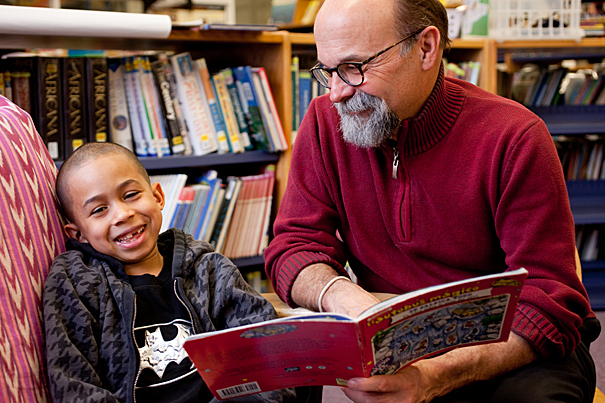
Rose Lincoln/Harvard Staff Photographer
Social change at ground level
When not coordinating an HGSE program, he’s volunteering, traveling, and penning poetry
Called to volunteerism by his “restless interest in social change,” Scott Ruescher is modest when discussing how each Thursday he heads to the Amigos School in Cambridge to relate stories to his reading buddies there. He’d rather play his kazoo.
Inside Ruescher’s office at the Harvard Graduate School of Education (HGSE), where he is a coordinator for the Arts in Education Program, joyous treasures lie. A fluorescent kazoo is one of the knickknacks decorating Ruescher’s desk, alongside artwork by graduates of the program and a glass apple paperweight, a gift from HGSE for his 20 years of service.
He’s hesitant to discuss that, too. He’d much prefer to do some sketching, as he does from time to time, applying the lessons he’s picked up from classes at the Cambridge Center for Adult Education. Or he could show you his chapbook, “Sidewalk Tectonics,” published by Puddinghouse Press, that he calls “a meandering travelogue of poems,” which begins at Abraham Lincoln’s birthplace in Kentucky and moves to Memphis, where Martin Luther King Jr. was assassinated.
If it was his interest in social issues that spurred the chapbook, it’s also what inspired him to travel to El Salvador with Learning Through Libraries, a program helmed by HGSE students promoting literacy and libraries in the poor rural municipality of Caluco. “I painted murals with schoolchildren,” said Ruescher of his week there, “played with the kids, and mingled with their mothers and teachers.”
He helped to organize and catalog a horde of donated books, too, and spent one afternoon cleaning a classroom soon to be transformed into a library. “I was standing on desks, with a wet rag in one hand and a pail of water in the other, washing off the dust of the nearby volcano and chatting with the teachers,” he recalled with poetic luster. “I even enjoyed getting stung by a wasp — and getting to use the word avispa in Spanish — after accidentally swiping a nest above the doorway with my rag.”
Ruescher grew interested in Latin America when he lived in Jamaica Plain, which has a large Hispanic population, in the 1970s. He has traveled a bit in Mexico, and he spent the week preceding the El Salvador project on his own in Guatemala, where he found that his Spanish is “somewhere between proficient and not quite fluent,” he joked. He’s spent the past two years (of nine volunteering at the Amigos School) reading in Spanish to second-graders. Last year, he was awarded the Mack Davis Award by the Cambridge School Volunteers for his dedicated duty.
Ruescher, an Ohio native, said he started off volunteering at a mental hospital and for a sociological researcher when he was in college. He has volunteered for Oxfam America and other organizations as well. “I started teaching English in a prison program for UMass in the ’80s,” he remembered. For the past eight years, Ruescher has taught at MCI-Norfolk, a medium security prison, for the Prison Education Program at Boston University’s Metropolitan College.
Ruescher maintains a community garden plot in Cambridgeport, where he lives, and has written numerous guest commentaries on local environmental issues for the Cambridge Chronicle. He is working on more poems about his time in Central America and plans to return on a Learning Through Libraries trip. In the meantime, Ruescher hopes his chapbook is flying off shelves at the Grolier Book Shop, a nearby poetry retailer.
If book sales are fueled by good karma, Ruescher’s got nothing to worry about.




